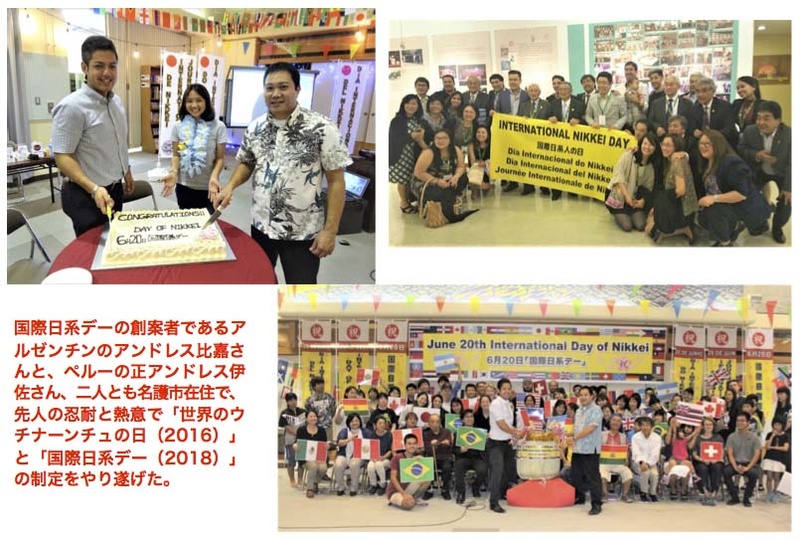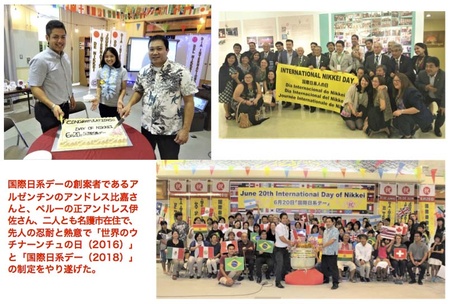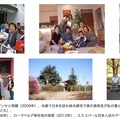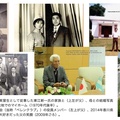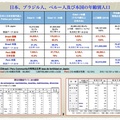In June 2018, June 20th was designated as International Nikkei Day at the 150th Anniversary of Japanese Immigration to Hawaii and the 59th Convention of Japanese People Abroad, both held in Honolulu.1 The idea for International Nikkei Day was proposed by Andres Higa, an Argentinian of Japanese descent living in Nago City, Okinawa Prefecture, 2 and Andres Tadashi Isa, a Peruvian of Japanese descent.3 Both men, whose ancestors are from Okinawa,4 felt a sense of crisis that their roots were becoming weaker with each passing generation, and began planning the idea for a World Uchinanchu Day in 2015, which they realized the following year at the 6th Uchinanchu Convention.5 It was around this time that the two men lobbied various relevant organizations to approve the idea for an International Nikkei Day, hoping that it would be an opportunity for people to feel proud of their Japanese roots. In September 2017, the idea was officially introduced at the Pan-American Convention of Japanese People in Lima, Peru, and was endorsed by participating countries.6
It is important for Japanese people of all generations to be able to identify their roots whenever they want. I believe that identity is something that one forms at one's own pace, influenced by family, social environment, living area (rural settlement or urban area), etc., and also by how the first generation's immigrant experience was conveyed (or not conveyed), and how the next generation will accept it, so it is something that constantly changes and evolves. Also, even though Japanese values such as diligence, perseverance, loyalty, and solidarity are inherited, the way they express and understand them varies from person to person, and the social environment greatly influences how they act. By the time they become fourth or fifth generation Japanese people, more and more of them have non-Japanese spouses, and inevitably their sense of being Japanese fades. On the contrary, it is proof that they have integrated into society and are living a respectable life, but I also hope that people will continue to feel their identity as Japanese people in some way, even as they pass through the generations.
In June 2018, I had the opportunity to hear from seventh and eighth generation Japanese-Americans in Hawaii. I was very impressed by what they said about their Japanese roots: "Even if we don't really think about it in our daily lives, when the topic comes up or we ask ourselves why we act or think differently from other people, perhaps the DNA of our ancestors is passed down to us as a kind of 'legacy.'"
Japanese immigrants, both before and after the war, overcame many hardships and trials. As many records show, at first, their hard work was not easily rewarded, they suffered from misunderstanding and discrimination in the local community, and sometimes even betrayed by their peers. The Japanese people's "hard work" sometimes manifests itself as a strong sense of unity and solidarity, which may have appeared exclusive and fostered misunderstandings. However, by helping each other and responding flexibly, it can be said that they ultimately contributed greatly to the development of the region. Over the course of 50, 100, or even 150 years, they won respect and trust. That is why it is important that on International Nikkei Day, we do not simply reaffirm our family's experiences and bonds, but also reflect on the lessons we have learned from the past with a broad perspective as a Nikkei community, taking into account the world situation at the time.
Over the past 15 years, the Japanese pop culture boom has been felt in Latin America, and Japanese festivals, Japanese cultural festivals, Bon Odori dances, bazaars, and other events are a huge success in every Japanese community. The scale and revenue generated by these events far exceeds expectations, and tens of thousands, even hundreds of thousands, of non-Japanese people have come to participate in these events. As a result, young Japanese people who had not previously shown much interest have begun to cooperate with the various businesses, and some Japanese entrepreneurs have even set up stalls at larger events in their local communities, helping to support the "Japanese food boom."
However, due to the impact of the COVID-19 pandemic, all of these events and Japanese culture-related classes were forced to be canceled. Many Nikkei leaders point out that if the current situation continues, the blow to the community will be immeasurable, but in every country, they are trying to maintain motivation by coming up with creative ways, such as holding workshops via the conference app Zoom7 . In fact, the originally planned International Nikkei Day event this year was canceled, but instead was held online. Prominent Nikkei people sent messages8 , in Brazil an event to celebrate International Nikkei Day was broadcast on YouTube and Facebook, and in Argentina young people took the lead in holding an online event, providing an opportunity to discuss their Nikkei roots.
Restrictions on movement and gatherings have been in place in much of Latin America for nearly half a year now amid the coronavirus pandemic, but there are still things that Japanese people can do.
One is to deepen your understanding of your family and the Japanese community in your country. You can look for old records (letters and photos) at home. You will surely find something new just by looking at those records or listening to the stories of when your grandparents immigrated if they are still alive. The second is to exchange opinions online with Japanese people who have returned from Japan for training or study abroad. Usually, when JICA trainees return to their home countries, they meet with their seniors and candidates who want to go to Japan to give a report, but it would be good to share more of the knowledge and know-how they gained in Japan through online and social media. In addition, this year's JICA training will be online, and we, the instructors, are trying our best to make it a fruitful experience. There will be no face-to-face classes and Japanese people cannot come to Japan, but there is surely a lot to learn, discover, and think about through messages from Japan.
In the midst of this pandemic and the ever-evolving digital economy, Nikkei people of all generations must carve out their own path and role with the pioneering spirit of immigrant pioneers. I am sure that Andres Higa and Tadashi Isa, the creators of International Nikkei Day, would like all Nikkei people to be more aware of that spirit.
Notes:
1. Alberto Matsumoto, " Hawaii's 'GANNENMONO' and 'Japanese Legacy' ", Discover Nikkei (February 7, 2020)
After graduating from the master's course at Meio University, he started working at the Nago City International Community House in 2014.
3. After graduating from Meio University, he worked at the university's International Exchange Center.
4. For more information on the purpose and passion of these two people’s activities, please see the following essay: Roberto Oshiro Teruya, “ International Nikkei Day: June 20, 2018 ,” Discover Nikkei (July 31, 2018)
5. There are currently an estimated 420,000 people of Okinawan descent in the world, who are the descendants of people who emigrated before and after the war. The largest community is in Brazil with about 200,000 people, the second largest in Peru (about 70,000 people), and the third largest in Hawaii (45,000 people) (estimated).
" Worldwide Uchinanchu Day " Worldwide Uchinanchu Network
" Leaping Forward: The History of Okinawan Immigrants and Uchinanchu Around the World ," News from the Overseas Migration Museum (February 2014)
" Distribution Map of Okinawans ," Ryukyu Shimpo (December 9, 2012)
6. According to the Association of Japanese Abroad , in addition to "International Nikkei Day" and "World Uchinanchu Day," there is also "Overseas Emigration Day," which commemorates June 18th, the day the first immigrant ship to Brazil, the Kasato Maru, arrived at the port of Santos. This was established in 1966 by the then Prime Minister's Office (formerly the Cabinet Office), and the Brazilian side has also officially designated this day as "Japanese Emigration Day."
7. The Brazilian Cultural and Welfare Council ’s website lists various online events organized by the younger generation.
8. Association of Japanese Abroad, " June 18th is Overseas Emigration Day! June 20th is International Nikkei Day! " (3:35), YouTube.com (June 16, 2020)
Japón Hoy " INTERNATIONAL INTERNATIONAL INTERNATIONAL (20th of June) / JAPON HOY TV " (2:26) YouTube.com, (2020.6.20)
The Brazilian Cultural Association posted messages from more than 400 people on Facebook.
" SUCCESSFUL LIVE DATES DURING INTERNATIONAL DAYS IN JAPAN 2020 "
© 2020 Alberto J. Matsumoto


